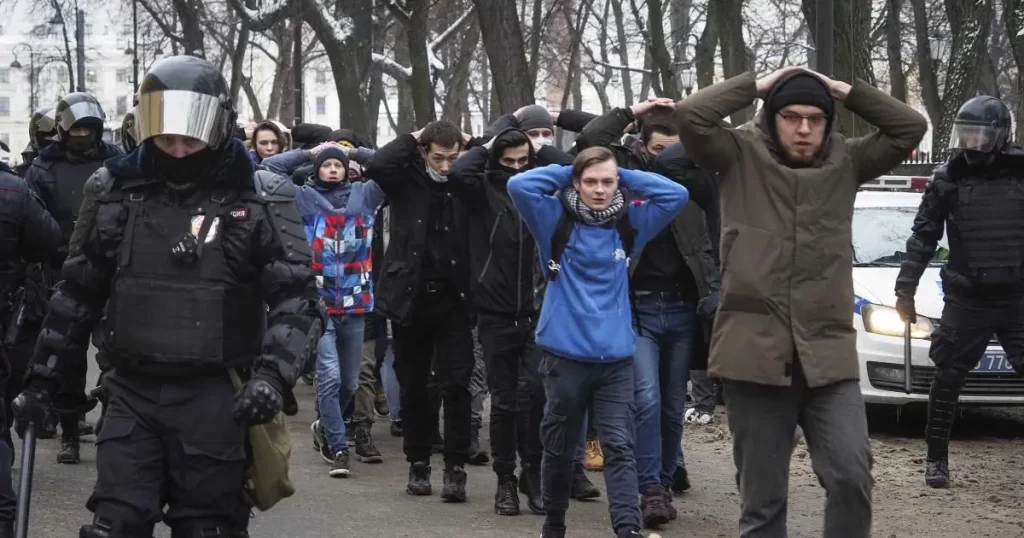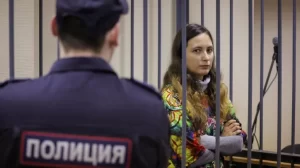UN Report Reveals Deepening Human Rights Crisis in Russia
3 min read
Police detain protesters at a rally against the jailing of opposition leader Alexei Navalny in St. Petersburg, January 31, 2021.

Police detain protesters at a rally against the jailing of opposition leader Alexei Navalny in St. Petersburg, January 31, 2021.
A recent United Nations report highlights a significant deterioration in human rights conditions in Russia since the full-scale invasion of Ukraine, marking a period of systematic repression against civil society. The investigation, led by UN special rapporteur Mariana Katzarova, reveals alarming instances of police brutality, suppression of independent media, and aggressive measures to silence critics of the Kremlin.
Denied entry into Russia, Katzarova conducted her research through interviews with political groups, activists, and lawyers. The findings include credible allegations of torture, sexual violence, and threats of abuse by law enforcement officers. The report underscores that human rights abuses have escalated sharply in the wake of the February 2022 invasion, exacerbating a previously declining situation under President Vladimir Putin’s regime.
Particularly concerning are new laws enacted in recent years targeting the dissemination of what the government deems “fake news” and punishing individuals or organizations perceived to receive foreign support. These legislative measures have led to widespread arrests and lengthy prison sentences for dissenters. One notable case cited is that of Artyom Kamardin, who received a seven-year sentence for reciting an anti-war poem in public, an act the authorities branded as “inciting hatred.”
Katzarova expressed her shock at the harsh penalties being handed down. “It’s seven years for reading an anti-war poem, or for expressing any form of opposition,” she told the BBC. “Two women remain imprisoned for their anti-war stance.” She commended those who continue to resist despite the threats, suggesting that opposition to the war is more widespread than is publicly acknowledged. “In a totalitarian state, people often avoid speaking out to evade trouble, but that doesn’t mean they support the government’s aggressive actions,” she noted.
The report also criticizes the Russian government for its attempts to indoctrinate children regarding the Ukraine conflict through mandatory school lessons, referred to as “important conversations.” Children who refuse to attend these classes face pressure and harassment, as illustrated by the case of a fifth-grader from Moscow who was interrogated by police after skipping class, leading to charges against the child’s mother for “failing to fulfill parental duties.

Additionally, the report sheds light on the coercive mobilization practices for the conflict in Ukraine. Many men have reportedly been recruited through deception or force, while those who resist conscription are often detained and threatened with violence or imprisonment. The report highlights a disproportionate impact on indigenous communities, suggesting that they are being targeted as “disposable” recruits rather than individuals from more privileged backgrounds in cities like St. Petersburg or Moscow.
Katzarova warns, “Indigenous people face the threat of extinction if these practices continue.” She suggests that the government’s mobilization strategy reflects a troubling disregard for the lives of marginalized groups, further compounding the human rights crisis.
Among other findings, the report accuses judges of acting as mere “mouthpieces” for the government due to extensive political interference in the judicial system. It describes Russia as increasingly homophobic, pointing to new laws that infringe on the rights of LGBTQ+ individuals. The crackdown on dissent has disproportionately affected female anti-war activists, who are reportedly more vulnerable in custody.
The report paints a grim picture of a “climate of fear and repression” across the country, particularly in regions like Chechnya, where police brutality is rampant. The situation in Chechnya serves as a warning of what may unfold elsewhere in Russia if current trends continue.
Importantly, the report focuses on human rights issues within Russia’s internationally recognized borders and does not address reported abuses occurring in Russian-occupied territories in Ukraine, Georgia, and Moldova.
In conclusion, the UN report underscores a critical human rights crisis in Russia, driven by government actions that aim to suppress dissent and control the narrative surrounding the Ukraine conflict. The findings call for urgent attention from the international community, emphasizing the need for accountability and protection of fundamental human rights in Russia.